Recommended Blogs
Comprehensive Guide to ML Model Testing and Evaluation
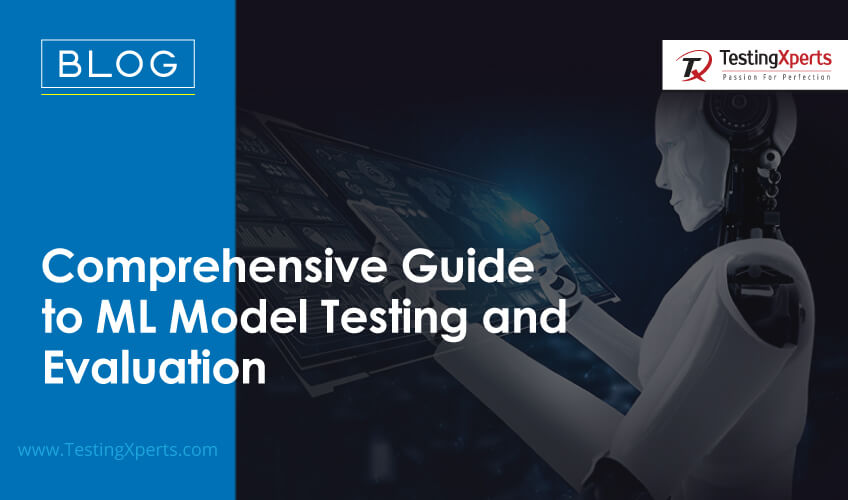
Table of Contents
- What is ML testing?
- Types of ML Testing
- Evaluation Metrics for ML Models
- How to Test Machine Learning Models?
- Ethical Considerations in ML Testing
- Tools and Frameworks for ML Testing
- Conclusion
- Why Choose TestingXperts for ML Testing?
From smart assistants making our lives easier to sophisticated algorithms detecting medical conditions, the applications of machine learning technology are noticeable. Yet, as we increasingly rely on these algorithms, a question arises: how can we trust them?
Unlike traditional software, which follows explicit instructions, ML algorithms learn from data, drawing patterns and making decisions. This learning paradigm, while highly intelligent, introduces complexities. If traditional software fails, it’s often due to a coding error – a logical misstep. But when an ML model fails, it could be due to various reasons:
• A bias in the training data
• An overfitting bugs
• An unforeseen integration of variables
As ML models are involved in critical decision-making like approving loans, steering autonomous vehicles, or diagnosing patients, there could be chances of errors. This is why ML testing is a crucial process that every business needs to implement. It ensures that the ML models operate responsibly, accurately, and ethically.
What is ML testing?
Machine learning testing is the process of evaluating and validating the performance of machine learning models to ensure their correctness, accuracy, and robustness. Unlike traditional software testing, which mainly focuses on code functionality, ML testing includes additional layers due to the inherent complexity of ML models. It ensures that ML models perform as intended, providing reliable results and adhering to industry standards.
Importance of ML Testing
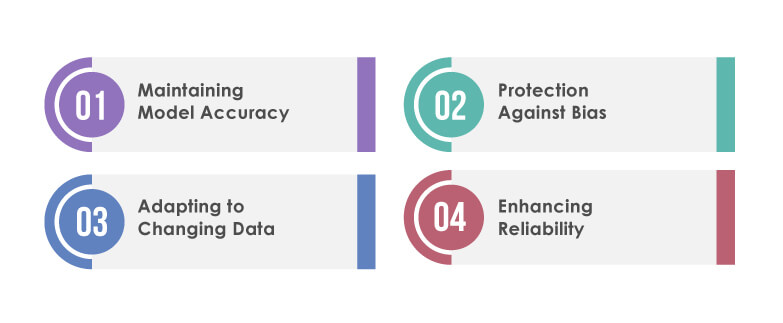
Maintaining Model Accuracy
ML models are trained on historical data, and their accuracy largely depends on the quality and relevance of this data. ML model testing helps identify bugs between predicted and actual outcomes, allowing developers to fine-tune the model and enhance its accuracy.
Protection Against Bias
Bias in ML models can lead to unfair or discriminatory outcomes. Thorough testing can reveal biases in data and algorithms, enabling developers to address them and create more equitable models.
Adapting to Changing Data
Real-world data is constantly evolving. ML testing ensures that models remain effective as new data is introduced, maintaining their predictive power over time.
Enhancing Reliability
Robust testing procedures strengthen the reliability of ML systems, instilling confidence in their performance and reducing the risk of unexpected failures.
Types of ML Testing
Let us look into various types of ML testing, each meant to address specific aspects of model performance, all while keeping things simple and easy to understand
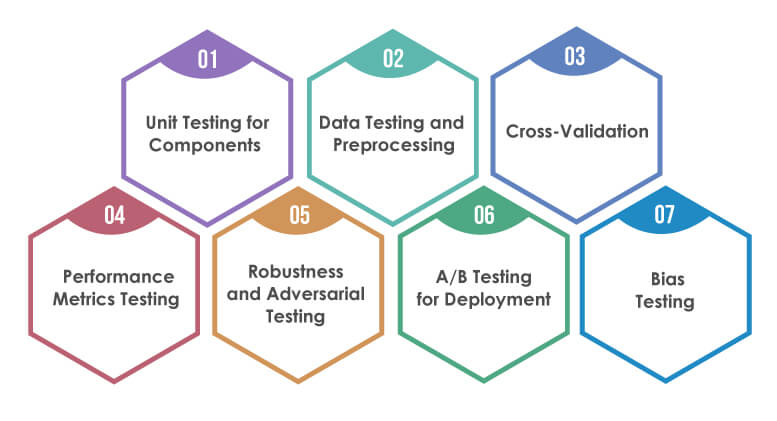
Unit Testing for Components
Like traditional software testing, unit testing in ML focuses on testing individual components of the ML pipeline. It involves assessing the correctness of each step, from data preprocessing to feature extraction, model architecture, and hyperparameters. Ensuring that each building block functions as expected contributes to the overall reliability of the model.
Data Testing and Preprocessing
The quality of input data impacts the performance of an ML model. Data testing involves verifying the data’s integrity, accuracy, and consistency. This step also includes preprocessing testing to ensure that data transformation, normalisation, and cleaning processes are executed correctly. Clean and reliable data leads to accurate predictions.
Cross-Validation
Cross-validation is a powerful technique for assessing how well an ML model generalises to new, unseen data. It involves partitioning the dataset into multiple subsets, training the model on different subsets, and testing its performance on the remaining data. Cross-validation provides insights into a model’s potential performance on diverse inputs by repeating this process and averaging the results.
Performance Metrics Testing
Choosing appropriate performance metrics is crucial for evaluating model performance. Metrics like accuracy, precision, recall, and F1-score provide quantitative measures of how well the model is doing. Performance Testing metrics ensures that the model delivers results per the intended objectives.
Robustness and Adversarial Testing
Robustness testing involves assessing how well the model handles unexpected inputs or adversarial attacks. Adversarial testing explicitly evaluates the model’s behaviour when exposed to deliberately modified inputs designed to confuse it. Robust models are less likely to make erroneous predictions under challenging conditions.
A/B Testing for Deployment
Once a model is ready for deployment, A/B testing can be employed. It involves deploying the new ML model alongside an existing one and comparing their performance in a real-world setting. A/B testing helps ensure that the new model doesn’t introduce unexpected issues and performs at least as well as the current solution.
Bias Testing
Bias in ML models can lead to unfair or discriminatory outcomes. To tackle this, bias and fairness testing aims to identify and mitigate biases in the data and the ML model’s predictions. It ensures that the model treats all individuals and groups fairly.
Evaluation Metrics for ML Models
One must rely on evaluation metrics to measure the performance and effectiveness of these models. These metrics provide valuable insights into how well ML models perform, helping fine-tune and optimise them for better results. Let us look into some of the metrics
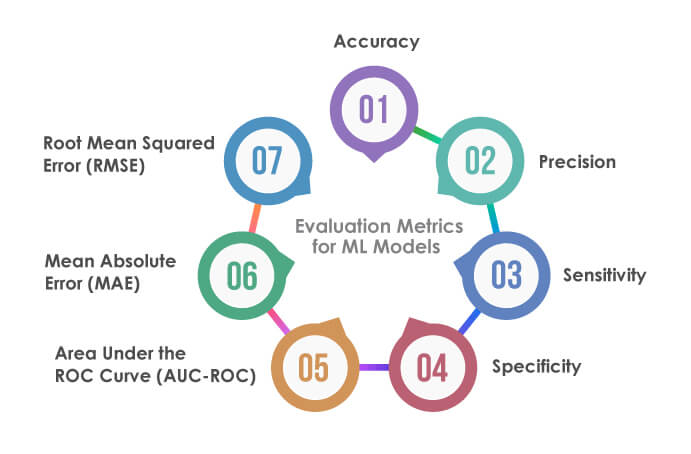
Accuracy
Accuracy is the most straightforward metric, measuring the ratio of correctly predicted instances to the total instances in the dataset. It provides an overall view of a model’s correctness. However, it might not be the best choice when dealing with imbalanced datasets, where one class dominates the other.
Precision
Precision focuses on the accuracy of positive predictions made by the model. It is the ratio of accurate positive predictions to the sum of true positives and false positives. Precision is valuable when false positives are costly or undesirable.
Sensitivity
Sensitivity, or true positive rate, assesses the model’s ability to capture all positive instances. It is the ratio of true positives to the sum of true positives and false negatives. Recall is crucial when the consequences of false negatives are significant.
Specificity
Specificity, also known as the true negative rate, evaluates a model’s ability to identify negative instances correctly. It’s the ratio of true negatives to the sum of true negatives and false positives. Specificity is valuable when focusing on the performance of negative predictions.
Area Under the ROC Curve (AUC-ROC)
The AUC-ROC metric is helpful for binary classification problems. It plots the true positive rate against the false positive rate, visually representing a model’s ability to distinguish between classes. AUC-ROC values closer to 1 indicate better model performance.
Mean Absolute Error (MAE)
Moving beyond classification, MAE is a metric used in regression tasks. It measures the average absolute difference between predicted and actual values. It gives us an idea of how far our predictions are from reality.
Root Mean Squared Error (RMSE)
Like MAE, RMSE is a regression metric focusing on the square root of the average squared differences between predicted and actual values. It penalises more significant errors more heavily than smaller ones.
How to Test Machine Learning Models?
Testing ML models involves specific strategies tailored to their unique complexities. Let’s look at how to test machine learning models effectively, providing actionable steps to enhance their performance:

Understand Your Data
Before starting with testing, it’s essential to have a deep understanding of your dataset. Explore its characteristics, distribution, and potential challenges. This knowledge will help you design effective testing scenarios and identify potential pitfalls.
Split Your Data
Divide your dataset into training, validation, and testing sets. The training set is used to train the model, the validation set helps fine-tune hyperparameters, and the testing set assesses the model’s final performance.
Unit Testing for Components
Start by testing individual components of your ML pipeline. This includes checking data preprocessing steps, feature extraction methods, and model architecture. Verify that each component functions as expected before integrating them into the entire pipeline.
Cross-Validation
Utilise cross-validation to assess your model’s generalisation capabilities. Apply techniques like K-fold cross-validation, where the dataset is divided into K subsets, and the model is trained and evaluated K times, each time using a different subset for validation.
Choose Evaluation Metrics
Select appropriate evaluation metrics based on the nature of your problem. For classification tasks, precision, accuracy, recall, and F1-score are standard. Regression tasks often use metrics like MAE or RMSE.
Regular Model Monitoring
Machine learning models can degrade over time due to changes in data distribution or other factors. Regularly monitor your deployed models and retest them periodically to ensure they maintain their accuracy and reliability.
Ethical Considerations in ML Testing
With rigorous testing and refining ML models, it’s vital to consider the ethical implications that may arise. Let us explore the ethical considerations regarding ML testing, potential pitfalls, and how to ensure testing practices align with ethical rules
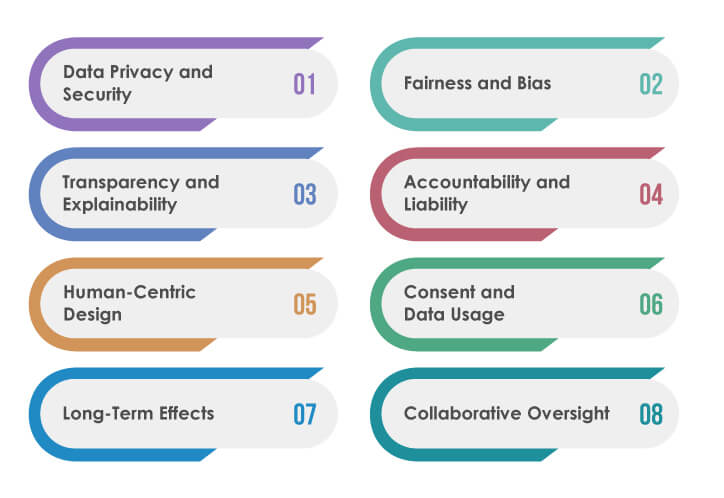
Data Privacy and Security
The data must be treated with the utmost care when testing ML models. Ensure that sensitive and personally identifiable information is appropriately encrypted to protect individuals’ privacy. Ethical testing respects the rights of data subjects and safeguards against potential data breaches.
Fairness and Bias
Examining whether they exhibit bias against certain groups is essential when testing ML models. Tools and techniques are available to measure and mitigate bias, ensuring that our models treat all individuals fairly and equitably.
Transparency and Explainability
ML models can be complex, making their decisions challenging to understand. Ethical testing includes evaluating the transparency and explainability of models. Users and stakeholders should understand how the model arrives at its predictions, fostering trust and accountability.
Accountability and Liability
Who is accountable if an ML model makes a harmful or incorrect prediction? Ethical ML testing should address questions of responsibility and liability. Establish clear guidelines for identifying parties responsible for model outcomes and implement mechanisms to rectify any negative impacts.
Human-Centric Design
ML models interact with humans, so their testing should reflect human-centred design principles. Consider the end-users needs, expectations, and potential impacts when assessing model performance. This approach ensures that models enhance human experiences rather than undermine them.
Consent and Data Usage
Testing often involves using real-world data, which may include personal information. Obtain appropriate consent from individuals whose data is used for testing purposes. Be transparent about data use and ensure compliance with data protection regulations.
Long-Term Effects
ML models are designed to evolve. Ethical testing should consider the long-term effects of model deployment, including how the model might perform as data distributions change. Regular testing and monitoring ensure that models remain accurate and ethical throughout their lifecycle.
Collaborative Oversight
Ethical considerations in ML testing should not be limited to developers alone. Involve diverse stakeholders, including ethicists, legal experts, and representatives from the affected communities, to provide a holistic perspective on potential ethical challenges.
Tools and Frameworks for ML Testing
Various ML testing tools and frameworks are available to streamline and enhance the testing process. Let’s look into some tools and frameworks that can help you navigate the complexities of ML testing effectively

TensorFlow
TensorFlow, developed by Google, is one of the most popular open-source frameworks for ML testing. It offers a wide range of tools for building and testing ML models. TensorFlow’s robust ecosystem includes TensorFlow Extended (TFX) for production pipeline testing, TensorFlow Data Validation for testing data in machine learning, and TensorFlow Model Analysis for in-depth model evaluation.
PyTorch
PyTorch is another widely used open-source ML framework known for its dynamic computation graph and ease of use. PyTorch provides tools for model evaluation, debugging, and visualisation. For example, the “torchvision” package offers various datasets and transformations for testing and validating computer vision models.
Scikit-learn
Scikit-learn is a versatile Python library that provides data mining, analysis, and machine learning tools. It includes a variety of algorithms and metrics for model evaluation, such as cross-validation and grid search for hyperparameter tuning.
Fairlearn
Fairlearn is a toolkit designed to assess and mitigate fairness and bias issues in ML models. It includes algorithms to reweight data and adjust predictions to achieve fairness. Fairlearn helps you test and address ethical considerations in your ML models.
Conclusion
Testing machine learning models is a systematic and iterative process that ensures your models perform accurately and reliably. Following this guide, you can identify and address potential issues, optimise performance, and deliver AI solutions that meet the highest standards. Remember that testing is not a one-time event. It’s an ongoing process that protects the effectiveness of machine learning models throughout their lifecycle.
Why Choose TestingXperts for ML Testing?
Ensuring the reliability, accuracy, and performance of ML models is crucial in the rapidly evolving structure of machine learning applications. At TestingXperts, we offer unparalleled ML Testing Services designed to empower businesses with robust and dependable AI-driven solutions. As enterprises explore the differences in deep learning vs machine learning, ensuring the quality and performance of these models becomes even more critical. Partnering with TestingXperts means utilising our deep expertise, cutting-edge tools, and proven methodologies to validate and optimise ML models for success.
Industry-Leading Expertise
Our skilled professionals have a deep understanding of diverse ML algorithms, data structures, and frameworks, enabling them to devise comprehensive testing strategies tailored to your unique project requirements.
Comprehensive Testing Solutions
We offer end-to-end ML testing solutions encompassing every model development cycle aspect. From data preprocessing and feature engineering to model training and deployment, our services ensure a thorough examination of your ML system at every stage, enhancing accuracy and robustness.
Algorithmic Depth
Our ML testing experts possess an in-depth understanding of a wide array of ML algorithms and techniques. This knowledge enables us to uncover the complexities of your models and pinpoint potential vulnerabilities or inefficiencies, resulting in AI systems that excel in real-world scenarios.
Performance under Edge Cases
We rigorously evaluate how your ML models perform in edge cases, pushing the limits of their capabilities and uncovering potential weaknesses that could arise in unconventional situations.
Continuous Monitoring Solutions
TestingXperts offers continuous monitoring services, enabling you to keep a vigilant eye on your ML models even after deployment. This proactive approach ensures that your AI-powered solutions adapt and remain performant as they encounter new data and challenges. To know more about our ML testing services, contact our experts now.
FAQs
ML testing differs from traditional testing, focusing on data validation, model accuracy, and performance under varying conditions. Unlike rule-based software, ML models learn from data, requiring continuous testing to detect biases, inconsistencies, and unexpected behaviors.
Testing ML models involves several challenges, such as ensuring data quality and relevance, handling model complexity and interpretability, and addressing scalability and resource constraints. Since ML models continuously learn, testing must validate predictions across different datasets while ensuring fairness, security, and regulatory compliance.
ML testing involves unit testing for algorithms, data validation, bias detection, adversarial testing, and model evaluation. Model explainability tests and A/B testing help assess accuracy and fairness, while retraining tests ensure models stay relevant over time.
Machine learning testing is about checking whether models actually work as intended. It goes beyond code and looks at how data, algorithms, and predictions interact. By validating accuracy and fairness, teams can spot errors early and make sure results remain trustworthy in real-world use.
Organisations today rely heavily on automated decisions. If models fail or drift, it can damage trust and lead to costly mistakes. Regular testing helps ensure outputs are fair, accurate, and compliant with regulations. It also gives businesses the confidence to scale AI systems safely and responsibly.
In practice, teams use frameworks such as TensorFlow Extended, PyTest, and specialist monitoring dashboards. These help with automating tests, checking data quality, and tracking performance once models go live. When combined with CI/CD pipelines, they support smooth retraining and deployment, keeping systems stable and dependable.
Continuous testing means models aren’t just verified once but checked regularly as fresh data arrives. It combines monitoring, validation, and retraining whenever performance dips. This approach helps organisations spot issues quickly, remain compliant, and ensure their AI systems keep delivering fair and reliable results for users.
When models are tested properly, users get accurate recommendations, fair outcomes, and dependable predictions. For example, in retail or finance, that might mean more relevant offers or safer approvals. Testing builds trust, encourages repeat use, and shows customers that the organisation values transparency and reliability.
Automation enhances ML testing by accelerating data validation, running large-scale simulations, and efficiently detecting biases. Automated testing tools can also evaluate model drift, monitor performance, and streamline retraining, ensuring ML models remain accurate and reliable in production.
Discover more
